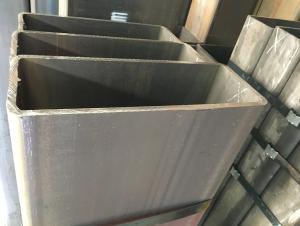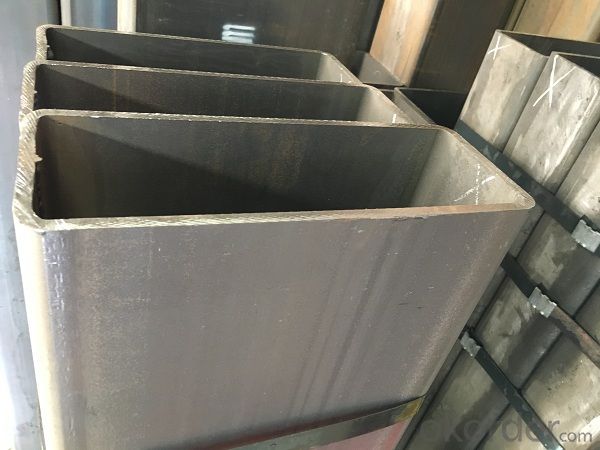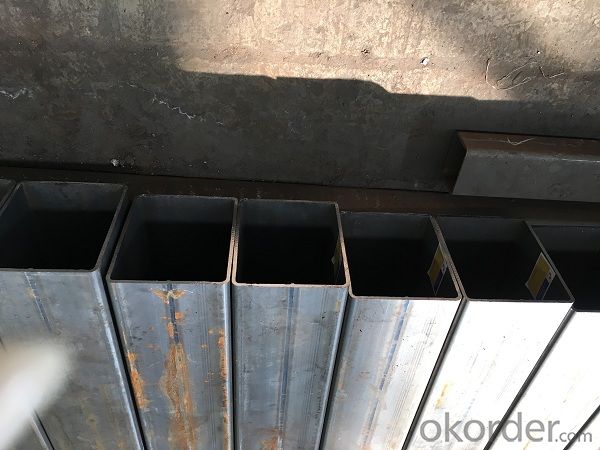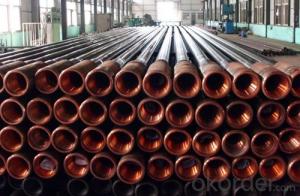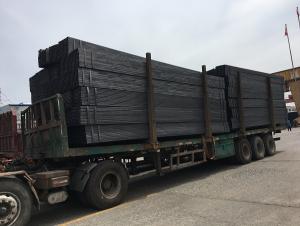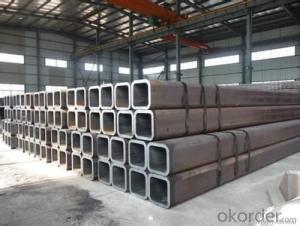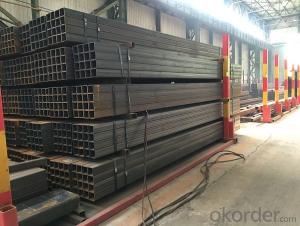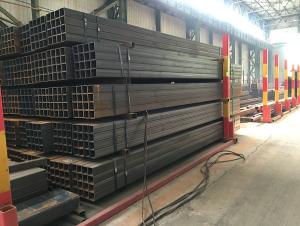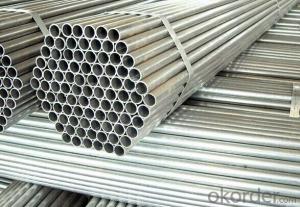Welded square rectangular tubes for structure
- Loading Port:
- Tianjin
- Payment Terms:
- TT or LC
- Min Order Qty:
- 17 m.t.
- Supply Capability:
- 13000 m.t./month
OKorder Service Pledge
OKorder Financial Service
You Might Also Like
1、 Welded square rectangular tubes for structure :
Square tube, square tube is a kind of call and rectangular tube, is equal and not equal to the length of steel pipe. Is the strip through the process of processing roll system. In general is the strip through the demolition of the package, flat, curly, welded to form a circular tube, and then rolled into a square tube and then cut into a square tube and then cut into the required length.
2、 Welded square rectangular tubes for structure
• Strong heat dissipation ability
• Good visual effect
• Reasonable price
• High manufacturing accuracy
• High strength
• Small inertia resistance
3、 Welded square rectangular tubes for structure :
Standard | GB, DIN, ASTM |
Grade | 10#-45#, 16Mn 10#, 20#, 45#, 16Mn |
Thickness | 1.5 - 25 mm |
Section Shape | Square and rectangular |
Outer Diameter | 20*20 mm-------400*400mm 20*30mm*300*500mm |
Place of Origin | Tianjin, China (Mainland) |
Length | 3-12M |
Outer Diameter | 20*20 mm-------400*400mm 20*30mm*300*500mm |
Grade | 235B 345B |
Standard | ASME, ASTM |
1) Material:(ASTM A 106/A53 GRB.API5LGRB,GB,235B,345B
2) Specification range:OD: 20*30mm----300*500mm 20*20 mm---400*400mm ,WT: 1.5 - 25 mm ,length:3-12m or according to the requirement of clients.
3) Excutive standards:GB,ASME API5L.ASTM A 106/A53,Despite of the above
4) Surface:black lacquered,varnish coating or galvanized.
5) Ends:Beveled or square cut ,painted.
6) Packing:bundles wrapped with strong steel strip,seaworthy packing.
4、Packaging & Delivery
Packaging Details: | seaworthy package,bundles wrapped with strong steel strip |
Delivery Detail: | 15-30days after received 30%TT |
5、 Welded square rectangular tubes for structure
①How is the quality of your products?
Our products are manufactured strictly according to national and internaional standard, and we take a test
on every pipe before delivered out. If you want see our quality certifications and all kinds of testing report, please just ask us for it.
Guaranteed: If products’ quality don’t accord to discription as we give or the promise before you place order, we promise 100% refund.
②How about price?
Yes, we are factory and be able to give you lowest price below market one, and we have a policy that “ for saving time and absolutely honest business attitude, we quote as lowest as possible for any customer, and discount can be given according to quantity”,if you like bargain and factory price is not low enough as you think, just don’t waste your time.Please trust the quotation we would give you, it is professional one.
③Why should you chose us?
Chose happens because of quality, then price, We can give you both.Additionally, we can also offer professional products inquiry, products knowledge train(for agents), smooth goods delivery, exellent customer solution proposals.Our service formula: good quality+good price+good service=customer’s trust
SGS test is available, customer inspection before shipping is welcome, third party inspection is no problem.
6、Seamless Pipe ASTM A106/53 Images:
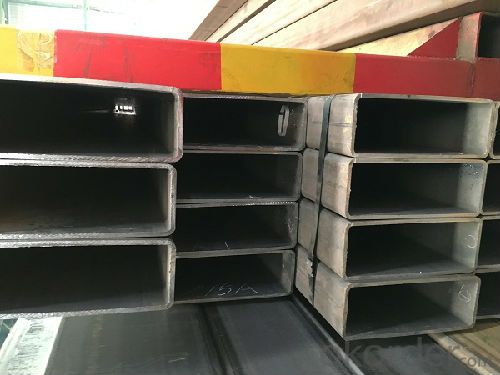
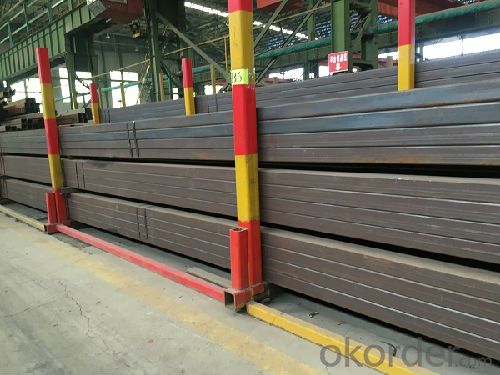
- Q: Can steel pipes be used for chemical refineries?
- Yes, steel pipes can be used for chemical refineries. Steel pipes are commonly used in chemical industries due to their high strength, durability, and resistance to corrosion. They can withstand high pressure and temperature conditions, making them suitable for transporting various chemicals and fluids within a refinery. Additionally, steel pipes can be easily welded, ensuring a secure and leak-proof system in chemical refineries.
- Q: How are steel pipes measured and labeled?
- Steel pipes are typically measured and labeled based on their diameter, wall thickness, and length. The diameter is measured in inches or millimeters, while the wall thickness is often expressed in inches or schedule numbers. The length is usually specified in feet or meters. Additionally, steel pipes may also bear labels indicating the type of steel used, industry standards compliance, and any specific certifications or markings required.
- Q: What is the difference between steel pipes and PEX pipes?
- Steel pipes are made from steel, a durable and strong material, while PEX pipes are made from cross-linked polyethylene, a flexible and lightweight material. Steel pipes are typically used for high-pressure applications, such as plumbing systems in commercial buildings, while PEX pipes are commonly used in residential plumbing due to their ease of installation, resistance to freezing and bursting, and lower cost. Additionally, steel pipes require threading and soldering for connections, while PEX pipes use push-fit or crimp fittings, making them easier to work with.
- Q: What is the impact of temperature on steel pipes?
- The impact of temperature on steel pipes is significant and can have both positive and negative effects. At high temperatures, steel pipes can experience thermal expansion, causing them to expand and potentially leading to distortion or buckling. This expansion can also affect the joints and connections, potentially causing leaks or failures. Therefore, it is crucial to consider the coefficient of thermal expansion when designing and installing steel pipes in high-temperature environments. On the other hand, steel pipes typically have excellent thermal conductivity, allowing them to withstand high temperatures without significant degradation. This makes them suitable for applications where heat transfer is a primary concern, such as in industrial processes or heating systems. Extreme cold temperatures can have detrimental effects on steel pipes as well. In freezing conditions, water or other fluids inside the pipes can expand and lead to cracks or bursts. This can cause leaks, loss of fluid, and potential damage to surrounding structures. Therefore, appropriate insulation and preventive measures need to be taken to ensure the integrity of steel pipes in cold environments. Additionally, temperature variations can also affect the mechanical properties of steel, such as its tensile strength and toughness. For instance, exposure to elevated temperatures over an extended period can lead to a phenomenon known as thermal degradation, where the steel's strength decreases, making it more prone to deformation or failure. In conclusion, the impact of temperature on steel pipes is significant and can influence their structural integrity, thermal performance, and mechanical properties. Proper design, insulation, and maintenance are essential to ensure the safe and efficient operation of steel pipes in various temperature conditions.
- Q: How can two smooth steel pipes be joined? The size of the two pipe is different (except for welding)
- Rectangular fastener: used for the connection of two vertical intersecting steel tubes. It relies on the frictional force between the fastener and the steel tube to carry the load.Swivel fastener: used for connecting two steel tubes intersecting at any angle
- Q: How are steel pipes used in the manufacturing of oil refineries?
- Steel pipes are used in oil refineries for a variety of purposes, including transporting crude oil and other fluids, as well as for structural applications. They are commonly used for piping systems, carrying process fluids such as oil, gas, and water, throughout the refinery. Additionally, steel pipes are used to handle corrosive and high-pressure environments, making them essential for the safe and efficient operation of oil refineries.
- Q: What are the factors affecting the lifespan of steel pipes?
- There are several factors that can affect the lifespan of steel pipes. 1. Corrosion: Corrosion is one of the primary factors that can significantly reduce the lifespan of steel pipes. Exposure to moisture, chemicals, and other corrosive elements can lead to rusting and degradation of the pipe material over time. 2. Environmental conditions: The environment in which the steel pipes are installed plays a crucial role in their lifespan. Extreme temperatures, humidity, and exposure to various weather conditions can accelerate the corrosion process and weaken the pipe structure. 3. Water quality: The quality of the water flowing through the steel pipes can also impact their lifespan. Water with high acidity or alkalinity levels, excessive chlorine, or other contaminants can cause corrosion and deterioration of the pipe material. 4. Installation quality: The way steel pipes are installed can affect their lifespan. Poor installation practices, such as inadequate support or incorrect alignment, can lead to stress points and structural weaknesses, making the pipes more prone to failure. 5. Maintenance and repair: Regular maintenance and timely repairs are crucial in maximizing the lifespan of steel pipes. Proper cleaning, inspection, and corrosion protection measures can help identify and address potential issues before they progress and cause significant damage. 6. Design and material quality: The design and quality of steel used in pipe manufacturing are important factors in determining their lifespan. High-quality steel with appropriate alloy composition and thickness provides better resistance to corrosion and mechanical stress, ensuring a longer lifespan. 7. Load and pressure: The load and pressure that steel pipes are subjected to can impact their durability. Excessive pressure or frequent variations in pressure can put stress on the pipe walls, leading to fatigue or failure over time. By considering and addressing these factors, it is possible to extend the lifespan of steel pipes and ensure their reliable performance over an extended period.
- Q: Can steel pipes be used for chimney flues?
- Yes, steel pipes can be used for chimney flues. Steel pipes are often used as a viable option for chimney flues due to their durability, heat resistance, and ability to withstand high temperatures. However, it is important to ensure that the steel pipes used are specifically designed and approved for chimney flue applications to meet safety standards and regulations.
- Q: How are steel pipes used in HVAC systems?
- Steel pipes are used in HVAC systems for various purposes such as transporting hot or cold water, steam, or refrigerant throughout the system. They are commonly used for supply and return lines, as well as for connecting various HVAC components like chillers, boilers, air handlers, and heat exchangers. Steel pipes are preferred in HVAC systems due to their durability, strength, and resistance to corrosion and high pressure.
Send your message to us
Welded square rectangular tubes for structure
- Loading Port:
- Tianjin
- Payment Terms:
- TT or LC
- Min Order Qty:
- 17 m.t.
- Supply Capability:
- 13000 m.t./month
OKorder Service Pledge
OKorder Financial Service
Similar products
Hot products
Hot Searches
Related keywords
